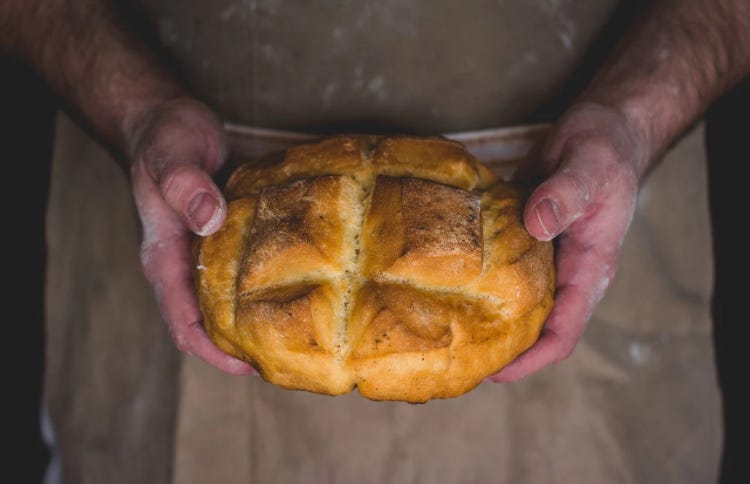This is probably the most controversial part of the Lord’s Prayer and has had received the most discussion throughout the history of the Church.
Matthew 6 v 11
Give us today our daily bread.
This is usually linked to later verses in the chapter about not worrying.
Matthew 6 v 25-27
Therefore I tell you, do not worry about your life, what you will eat or drink; or about your body, what you will wear. Is not life more than food, and the body more than clothes? Look at the birds of the air; they do not sow or reap or store away in barns, and yet your heavenly Father feeds them. Are you not much more valuable than they? Can any one of you by worrying add a single hour to your life?
If we ask God for ‘daily bread’, it means we are opening ourselves up to receiving God’s provision in any things. But the problem with this interpretations is with the word ‘daily’.
This is an extremely unusual word in Greek and therefore very hard to translate. Epiousion has been traditionally translated as ‘daily’, but translators have chosen other meanings too.
The most common alternative is ‘supersubstantial’. Making the bread mentioned in the Lord’s Prayer out to be beyond our requirements. Sometimes it is translated as ‘super-essential’, so it fulfils the role of quenching our hunger, and to the point where we won’t be hungry again.
It is thought epiousion might relate to the ‘next day’. So it’s the bread which lasts until tomorrow or the bread that never runs out.
Another view is that epiousion means it’s the bread which is necessary for existence. This was suggested in early Church history by authors including Origen. Later writers took this further to suggest it means bread which meets our physical and spiritual needs.
Another possible translation is it’s the bread of tomorrow, given to us today. The idea is it’s the bread from Christ’s coming Kingdom. The bread which never runs out or perishes. Eternal bread from an eternal Kingdom.
All this discussion makes me realise we don’t really know what epiousion means. We could even say, ‘What is it?’
In Exodus, we read about the manna.
Exodus 16 v 4 & 14-15
Then the Lord said to Moses, “I will rain down bread from heaven for you. The people are to go out each day and gather enough for that day.
When the dew was gone, thin flakes like frost on the ground appeared on the desert floor. When the Israelites saw it, they said to each other, “What is it?” For they did not know what it was.
Moses said to them, “It is the bread the Lord has given you to eat.”
This ‘What is it?’ bread is truly the daily bread, as it lasts for only one day. But it is also the bread which comes from Heaven, rained down by God. In the story, it meets the hunger of the Israelites in the wilderness. These Israelites, who have escaped from Egypt, and are looking forward to the Promised land.
Just like Christians, we have been separated from this World (Egypt) and are looking forward to the return of Christ and His Kingdom in the wilderness of the current age.
Jesus links Himself to the manna mentioned in Exodus.
John 6 v 48-51
I am the bread of life. Your ancestors ate the manna in the wilderness, yet they died. But here is the bread that comes down from heaven, which anyone may eat and not die. I am the living bread that came down from heaven. Whoever eats this bread will live forever. This bread is my flesh, which I will give for the life of the world.”
He is the bread which falls from Heaven. At the Eucharist, we are told the bread is the Body of Christ broken for us. One common argument is the ‘daily’ bread is the bread in the Communion. It is bread which is more than simply bread. It is epiousion, it is supersubstantial.
My personal views on this idea, is the daily bread is found in the Eucharist, and God uses this to meet all my physical and spiritual needs. It is the bread of the kingdom to come. And it never runs out.
The Eucharist is the core practice of our faith. It brings life to our soul and body. By praying for God’s epiousion bread, we are seeking Christ. By praying for this, we recognise the importance of this daily bread our lives.





I really loved reading this. I wrote about this a little while back; I’d be honored if you gave it a read
https://open.substack.com/pub/josephcottle/p/living-on-manna?r=jh7j1&utm_campaign=post&utm_medium=web&showWelcomeOnShare=true
As you said..."The Eucharist is the core practice of our faith. It brings life to our soul and body. By praying for God’s epiousion bread, we are seeking Christ. By praying for this, we recognise the importance of this daily bread our lives." Amen!!